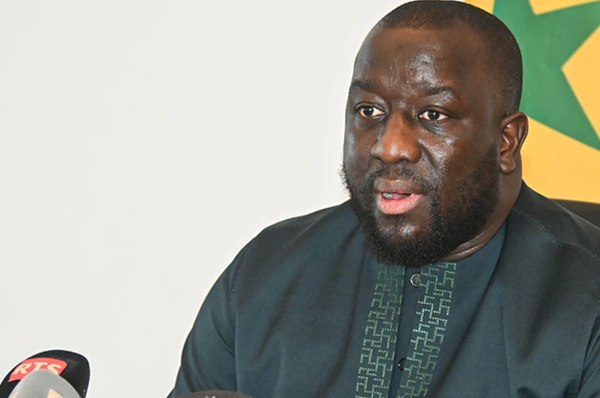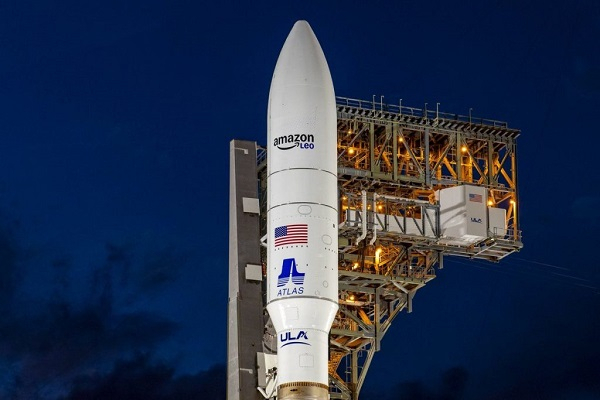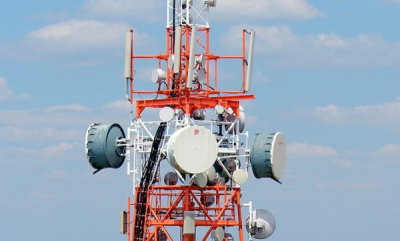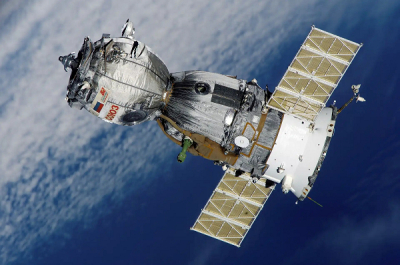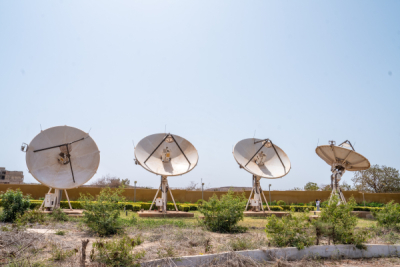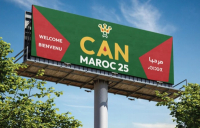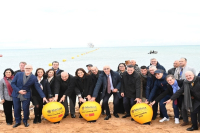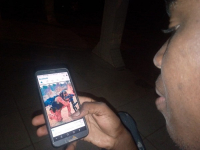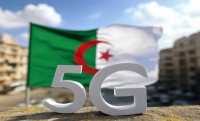
Telecom (183)
- Senegal plans to provide free Internet access to one million people through Starlink by June 2026.
- The government negotiated the purchase of 5,000 Starlink terminals at preferential rates.
- About 40% of Senegal’s population still does not use the Internet despite broad mobile network coverage.
The Senegalese government plans to rely on Starlink, which recently announced the launch of its commercial operations in Senegal, to provide free Internet access to one million people by June 2026. The Senegalese Press Agency cited a statement from the Ministry of Communication and Digital Economy saying that authorities negotiated the purchase of 5,000 terminals from the U.S. company at a preferential price.
For the executive, Starlink’s arrival represents a major strategic step toward universal Internet access. The low-Earth-orbit satellite constellation should significantly reduce coverage gaps by complementing or extending terrestrial networks, especially in hard-to-reach regions.
The government prioritizes white zones through community Wi-Fi solutions, as well as education, higher education, vocational training, local authorities, border areas, and the Diomaye Plan for Casamance. The initiative should significantly reduce connectivity costs for these users while providing access to very high-speed, reliable, and efficient Internet services.
This approach aligns with the government’s objective to democratize access to high and very high-speed broadband across the national territory. The strategy focuses particularly on rural and isolated areas, where terrestrial network deployment remains economically and technically challenging. The executive has positioned satellite technology as a strategic lever within a broader digital transformation agenda that integrates information and communication technologies across all sectors to accelerate socio-economic development.
However, data from the International Telecommunication Union show that 2G, 3G, and 4G networks already covered nearly the entire Senegalese territory in 2023. A 2025 study conducted under the Senegal Digital Economy Acceleration Project offers a more nuanced view.
The study found that 24% of localities lack any network coverage, affecting about 18,858 people. The study also showed that 37% of areas suffer frequent signal losses, only 52% benefit from 4G coverage, and some zones remain limited to 2G services.
The findings indicate that these shortcomings also affect social infrastructure, including schools and health centers in remote areas, which restricts access to essential services. In terms of usage, DataReportal estimated Internet penetration in Senegal at 60.6% at the end of 2025.
The initiative nonetheless raises questions about its scalability and its actual impact on Internet adoption. Even if authorities reduce obstacles such as cost and network coverage, other factors may limit usage, including access to Wi-Fi-compatible devices, digital skills, content availability, and issues related to security, ethics, and social norms.
This article was initially published in French by Isaac K. Kassouwi
Adapted in English by Ange J.A de BERRY QUENUM
- Amazon secured a seven-year landing permit to launch Project Kuiper satellite internet services in Nigeria from February 2026.
- The approval opens Nigeria’s LEO satellite broadband market to direct competition with Starlink, which counts more than 66,000 subscribers.
- Amazon plans Ka-band services with speeds of up to 400 Mbps, targeting households, businesses, and critical infrastructure.
Nigeria has opened its satellite broadband market to a new global player. Amazon secured a seven-year landing permit from the Nigerian Communications Commission, allowing Project Kuiper to launch internet services in the country from February 2026. The decision supports Nigeria’s strategy to diversify connectivity infrastructure and attract next-generation technology investment.
“The approval aligns with global best practices and reflects Nigeria’s commitment to opening its satellite communications market to next-generation broadband service providers,” the NCC said, highlighting the strategic importance of the authorization amid rising demand for connectivity.
The license allows Amazon Kuiper to operate its space segment in Nigeria as part of a global low-Earth-orbit constellation of up to 3,236 satellites. The authorization covers fixed satellite services, mobile satellite services, and earth stations in motion. These services target households, businesses, mobility use cases, logistics, aviation, maritime transport, and critical infrastructure.
Amazon’s entry ends Starlink’s quasi-exclusive dominance of Nigeria’s LEO satellite internet market. Starlink benefited from a first-mover advantage and built an estimated base of more than 66,000 subscribers. Kuiper’s arrival introduces direct competition between two global players with large financial, technological, and industrial resources. That rivalry could reshape pricing, service quality, and coverage.
From a technical standpoint, the authorization covers operations in the Ka frequency band, which supports high data transmission capacity. Amazon plans to use 100-MHz channels and deliver speeds of up to 400 Mbps while keeping terminal costs compatible with mass adoption. These features strengthen satellite broadband as a credible alternative to terrestrial networks, including in urban and semi-urban areas.
Nigeria represents a strategic market for Amazon. The country still faces major connectivity gaps despite its large population. According to the NCC, more than 23 million Nigerians live in unserved or underserved areas, while mobile broadband penetration reached 50.58% in November 2025. In that context, LEO satellites, which offer low latency, support advanced digital uses ranging from cloud computing to digital financial services.
Beyond households, Kuiper’s services could meet demand from businesses in oil and gas, mining, ports, and logistics corridors, where fiber deployment remains costly or technically complex. Amazon, which renamed Project Kuiper as Amazon LEO in November 2025, plans to leverage integration with Amazon Web Services to bundle connectivity with cloud services.
With this authorization, Nigeria strengthens its position as one of Africa’s most dynamic satellite broadband markets. Increased competition among LEO operators should gradually improve internet speed, affordability, and resilience, benefiting consumers, businesses, and Nigeria’s digital economy.
Samira Njoya, Ecofin Agency
- President Abdel Fattah al-Sisi has called for expanded local production of telecom equipment and development of data centers and cloud services.
- Egypt’s telecommunications sector accounts for about 6% of GDP and posts annual growth of 14%–16% for the seventh consecutive year.
- Egypt has attracted nearly $200 million in telecom manufacturing investments and aims to raise mobile phone output to 15 million units per year.
Since launching its “Vision 2030” development strategy in 2016, Egypt has positioned digital transformation as a central pillar of economic growth. The country has relied on the expansion of ICT infrastructure and the promotion of digital inclusion as key drivers of this strategy.
On Monday, Jan. 5, 2026, Egyptian President Abdel Fattah al-Sisi emphasized the need to open new horizons for the telecommunications and digital industries. He instructed officials to study opportunities to develop data centers and cloud computing services, expand local production of telecommunications equipment, and establish effective mechanisms to support and promote locally manufactured products.
Officials discussed these issues during a meeting that included Prime Minister Moustafa Madbouly, Minister of Communications and Information Technology Amr Talaat, and National Telecommunications Regulatory Authority (NTRA) Executive President Mohamed Shamroukh.
Amr Talaat said the telecommunications sector now contributes about 6% of Egypt’s gross domestic product and records annual growth ranging between 14% and 16% for the seventh consecutive year. He also reported that digital services exports have risen to $7.4 billion, compared with $3.3 billion seven years earlier.
By investing in the development of data centers, Egypt strengthens the security of strategic state data and data from key domestic market sectors. At the same time, the country attracts international companies by building infrastructure credibility, which supports its ambition to position itself as a regional hub for high-performance digital services.
Telecommunications currently represent one of the pillars of Africa’s digital economy, particularly in Egypt. Strengthening local equipment manufacturing reduces network transformation costs for telecom operators and supports further investment. Locally produced mobile phones, offered at more affordable prices, are expected to improve accessibility and expand the use of value-added digital services among a larger share of the population.
According to Amr Talaat, Egypt has increased mobile phone production capacity from 3.3 million units in 2018 to 10 million units in 2025, with local value added estimated at around 40%. The government aims to raise annual production capacity to 15 million units. Through industrial localization efforts launched in 2016, supported by several incentive schemes, Egypt has already attracted 15 international brands, including Samsung, Xiaomi, Oppo, Vivo, and Nokia, as well as nearly $200 million in investment.
Muriel EDJO
- Zimbabwe plans ZIMSAT-3 satellite under 2026-2030 development strategy
- Satellite to boost broadband, digital services in rural and urban areas
- Plan expands fibre, mobile networks, infrastructure sharing to cut costs
Zimbabwe plans to deploy a third national satellite, ZIMSAT-3, to improve connectivity, according to its National Development Strategy 2 (NDS2) for 2026-2030.
The satellite is expected to support broadband expansion and improve access to digital services in both rural and urban areas, the strategy document says.
The plan forms part of broader efforts to expand internet access nationwide. In March 2024, the government said it was exploring partnerships with several satellite service providers to extend coverage and lower costs.
NDS2 also sets out measures to expand digital infrastructure, including wider high-speed fibre-optic coverage in urban, peri-urban and rural areas, broader mobile broadband access, and the installation of solar-powered digital kiosks in off-grid and underserved communities.
The strategy calls for infrastructure-sharing agreements among telecommunications operators to speed up network deployment and reduce the cost of internet and digital services.
The move reflects the growing role of satellite technology in narrowing the digital divide, particularly in sub-Saharan Africa, where challenging terrain complicates the rollout of terrestrial networks, according to the GSMA.
Zimbabwe had 6.45 million internet users at the start of 2025, representing a penetration rate of 38.4%, DataReportal data show. The International Telecommunication Union estimates that 2G, 3G, 4G and 5G networks covered 93.9%, 87.9%, 51.6% and 15.9% of the country respectively in 2024.
Isaac K. Kassouwi
-
Coverage spans 13 African markets, including group and knockout games
-
Move strengthens Max it as pan-African digital content platform
Orange’s Middle East and Africa unit (OMEA) will broadcast 35 matches of the Africa Cup of Nations (AFCON) on its Max it super app, the company said on Monday. The tournament will be held in Morocco from Dec. 21, 2025, to Jan. 18, 2026.
The broadcasts will be available in 13 sub-Saharan African countries where Orange operates, including Burkina Faso, Botswana, Cameroon, the Central African Republic, the Democratic Republic of Congo, Ivory Coast, Guinea, Madagascar, Mali, Senegal, Sierra Leone, Liberia and Guinea-Bissau.
Coverage will include all group-stage matches involving national teams from countries where Orange has operations, as well as a selection of knockout-stage fixtures. These will include the round of 16 and quarter-finals, one semi-final, the third-place playoff and the final. Pre-match and post-match programming is also planned.
“This year, with Max it, we are bringing our digital vision to life by offering a fully integrated experience,” said Yasser Shaker, chief executive of Orange Middle East and Africa. “This initiative reflects our commitment to supporting our customers’ passion for football and to creating shared moments across the continent.”
Orange said the agreement strengthens its digital offering for African football fans during AFCON. These include a dedicated fan platform providing real-time content, statistics, interviews and match highlights. The group is also deploying artificial intelligence tools, including a multilingual chatbot designed to answer fan questions. In addition, Orange plans to install connected fan zones in several African countries.
The initiative aligns with OMEA’s strategy to position Max it as a pan-African digital content platform focused on inclusion, innovation and the promotion of African talent.
Launched in November 2023, Max it combines telecommunications, financial services, entertainment and digital content. Users can access online games, music, television, videos, films and news through the app.
Orange had 178 million subscribers across 17 countries in Africa and the Middle East in the third quarter of 2025. Max it had 17.4 million active users across 14 markets at the end of December 2024. At launch, the company said it expected the platform to reach 45 million users by the end of 2025.
The group is betting on smartphones as the primary gateway to digital services in Africa and the Middle East, where adoption among connected customers is expected to reach 61% in 2025.
Isaac K. Kassouwi
-
Sonatel Orange launches high-speed satellite internet services nationwide
-
The operator targets near-universal coverage by combining satellite, fiber, 5G, and 4G
-
The rollout supports Senegal’s Horizon 2050 digital infrastructure strategy
Sonatel Orange announced on December 22 the launch of its first high-speed satellite internet (VSAT) services in Senegal. The move positions the operator as the first in the market to offer near-national coverage by combining satellite technology with fiber-optic networks, 5G, and 4G, with the aim of narrowing access gaps between urban centers and remote areas.
Sonatel, premier opérateur de l’Internet par satellite au Sénégal
— Groupe Sonatel (@GroupeSonatel) December 22, 2025
Grâce à l’Internet par satellite, les zones les plus éloignées peuvent désormais accéder à une connectivité fiable, en complément de la Fibre, de la 4G et de la 5G.
L’offre satellite Orange renforce la résilience… pic.twitter.com/AwrjjM9jOd
Speaking at the launch, Sonatel Group Chief Executive Officer Brelotte Ba said the deployment aligns with the Senegalese government’s vision to modernize digital infrastructure. He said the operator now has the technological and operational capacity to support the implementation of the Senegal Horizon 2050 plan, relying on local infrastructure and national expertise.
Operationally, Sonatel Orange is using a technology mix that combines fixed networks, next-generation mobile networks, and satellite solutions. In partnership with Eutelsat/Konnect, the operator has been marketing satellite internet offers since December 10 for households and businesses, with coverage estimated at around 99% of the country. The unlimited plans primarily target rural, border, and hard-to-reach areas where terrestrial infrastructure remains limited.
The initiative fits into a broader public policy framework aimed at reducing territorial disparities and strengthening nationwide digital continuity. As part of this effort, Sonatel also plans to deploy an additional one million fiber-optic connections between 2026 and 2028, raising the number of homes that can be connected to nearly two million by 2028, including areas that have so far been underserved.
Beyond infrastructure expansion, the project also carries institutional and economic implications. By positioning itself as a technology partner to the state and local governments, Sonatel aims to support the digitalization of public services, particularly in education, healthcare, and public administration. The goal is to improve citizen access to essential digital services and strengthen digital inclusion across the country.
Samira Njoya
-
Operator supports CAN 2025 with connectivity and digital platforms
-
Fan-focused tools include real-time content and AI-powered assistance
-
Connected fan zones planned across several African countries
Orange said on December 19 that it will deploy its digital and connectivity solutions in support of the Africa Cup of Nations (AFCON) TotalEnergies 2025, scheduled to take place in Morocco from December 21, 2025, to January 18, 2026. The telecoms group said the move aims to showcase the role of digital infrastructure in shaping the modern sports experience.
Yasser Shaker, chief executive officer of Orange Middle East and Africa, said the partnership with the Confederation of African Football (CAF) reflects the company’s commitment to African sport. He said football represents a shared passion across the continent and added that Orange intends to bring its digital vision to life through its Max it platform, offering an integrated experience around the tournament.
As part of the initiative, Orange will roll out several digital tools designed to improve access to information and fan engagement. These include a dedicated digital platform for supporters, offering real-time content such as match highlights, statistics, interviews, and key moments from games. The group will also introduce artificial intelligence-based tools, including a multilingual conversational assistant designed to provide instant responses to fan queries.
Beyond digital services, Orange plans to set up connected fan zones in several African countries. These spaces will feature large screens and connectivity solutions to allow supporters, including those in less well-served areas, to follow the tournament in shared and immersive settings. According to the group, this approach aligns with its broader strategy to expand access to digital services across its networks.
Through this deployment, Orange seeks to strengthen its presence in major continental events while highlighting the growing role of telecoms and digital platforms in sports consumption across Africa.
Adoni Conrad Quenum
- Orange Maroc inaugurated Morocco’s first open-access cable landing station in Nador to host the Medusa subsea cable.
- The Medusa cable spans more than 8,700 kilometers and links 19 landing points between Europe and North Africa.
- Orange Maroc plans more than 100 billion dirhams ($10.9 billion) in infrastructure investments over 25 years.
Orange Maroc announced on Tuesday, December 16, the inauguration in Nador of Morocco’s first open-access cable landing station. The strategic infrastructure will host the Medusa subsea cable. The cable extends over more than 8,700 kilometers and connects 19 landing points between Europe and North Africa. The system will strengthen Morocco’s international connectivity and support its ambition to become a regional digital hub.
“This is an infrastructure that Orange Maroc teams designed and delivered through local expertise, with active participation from Orange Group experts. It will allow Morocco to strengthen its digital sovereignty and support the digital development of the Moroccan economy,” said Mohamed Benali, Chief Technology & Information Officer of Orange Maroc.
The Medusa project targets data transmission capacity of up to 20 terabits per second per fiber pair through next-generation optical fiber technology. The cable connects Nador directly to Marseille and to other strategic points in the Mediterranean. This configuration will strengthen the resilience of digital exchanges between North Africa and Europe while diversifying connectivity routes. The landing station built by Orange Maroc covers 3,500 square meters and includes IT capacity designed to host advanced digital services.
A project aligned with a national and regional strategy
These developments align with Orange Maroc’s long-term strategy. The company plans more than 100 billion dirhams in investments over 25 years to develop national digital infrastructure. The strategy supports 5G deployment, artificial intelligence solutions, and digital sovereignty initiatives through the Orange Tech data center and cloud partnerships.
At a broader level, these initiatives also align with Morocco’s digital transformation ambitions. The country aims to build a high-performance, sustainable, and competitive digital ecosystem. This ecosystem will support national economic growth while integrating social and environmental commitments, including a target of 100% renewable energy use by 2040.
Economic and technological impacts
From an economic perspective, the arrival of the Medusa cable could reshape Morocco’s digital landscape. Improved international connectivity will attract new technology investments. The infrastructure will support the expansion of digital services and reduce bandwidth costs for businesses and users. The cable will also provide strategic redundancy amid rising data flows and growing demand driven by 5G, cloud computing, and artificial intelligence.
This article was initially published in French by Samira Njoya
Adapted in English by Ange Jason Quenum
- Burkina Faso enforces 2023 telecom rules, extending balances and boosting user rights
- Consumers say measures still miss core demand for lower internet prices
- Regulator reports price drops, though affordability remains far above ITU benchmark
Burkina Faso’s telecom regulator announced new consumer protection rules on Tuesday, but customers said the measures fall short of their main demand: lower internet prices.
The Regulatory Authority for Electronic Communications and Posts (ARCEP) said the rules, suspended since they were adopted in 2023, are now enforceable following a court ruling. The changes include extending the validity of users’ main account balances from 90 to 180 days, allowing promotional credits to be used across all networks, and giving customers a grace period to reclaim unused call credit and data. The regulator also set a minimum one-month validity for 1-GB data bundles.
Alongside lower prices, subscribers are calling for clearer improvements in service quality, slower data depletion, better usage-tracking tools, and new offers such as unlimited plans.
The rules were drafted after a consumer boycott movement in mid-April 2023 targeted operators Orange, Moov Africa and Telecel over high costs and poor service. Public frustration has persisted since then, often voiced on social media.
ARCEP says the new measures are “concrete, objective and operational,” and will help lower service costs and strengthen consumer protections.
According to Executive Secretary Wendlassida Patrice Compaoré, the changes have already reduced the average prices of standard mobile internet plans from Orange Burkina Faso and ONATEL by between 28% and 45%, depending on plans with at least a one-month validity. Regulatory decisions regarding Orange Burkina Faso have also halved SMS prices to other national networks and forced operators to gradually make bonuses usable across all networks.
The International Telecommunication Union (ITU) reveals that monthly mobile internet spending in Burkina Faso amounted to 8.8% of GNI per capita in 2025. For a service to be considered affordable, this ratio must be below 2%. The African average is 5.32%, compared with 1.38% globally.
Isaac K. Kassouwi
- Algeria launches phased 5G rollout after issuing licenses to three operators
- Six-year plan starts with eight pilot provinces amid rising bandwidth demand
- High deployment costs and device affordability pose challenges to nationwide adoption
Algerian authorities on Wednesday officially launched 5G services, calling it a key step in modernizing the country’s telecommunications sector. The move marks the beginning of a phased rollout intended to boost the digital economy.
Telecom operators can now install their first 5G sites and prepare offers for both consumers and businesses. The government plans a deployment that will take place over six years under a national plan calling for gradual and balanced coverage. Eight provinces will serve as pilot zones before the network is extended nationwide.
The launch follows the awarding of 5G licenses last July to Mobilis, Djezzy and Ooredoo, a decision confirmed in the Official Gazette on Nov. 24. The licensing terms detailing the technical, financial and coverage requirements were published at the same time. The licenses cost 63.9 billion dinars, or about 492 million dollars.
Authorities say the introduction of 5G marks a new stage in the country’s connectivity as demand for bandwidth grows rapidly. The technology is expected to support the expansion of artificial intelligence, the Internet of Things, cloud computing and other advanced services. Sectors such as health, industry, education and smart mobility are expected to benefit. Tests conducted by Mobilis in February 2025 reached speeds of up to 1.2 gigabits per second.
Several questions remain, including how extensive coverage will be. According to a 2022 study by Ericsson, the base cost of deploying 5G in any country ranges between 3 billion and 8 billion dollars, with an additional investment of 20 percent to 35 percent required to expand coverage. This raises concerns that deployment in Algeria could favor more profitable urban areas while leaving rural regions behind.
Affordability is another challenge. According to a 2022 report by the GSMA, 5G-compatible smartphones start at around 150 dollars from several manufacturers, a price still inaccessible for many African consumers, especially when upfront payment is required. The organization estimates that device financing programs will likely be needed to make these phones affordable and help drive 5G adoption.
Isaac K. Kassouwi
More...
- Orange Sierra Leone inaugurated a €23 million ($26.7 million) backup datacenter in Bo.
- The company invested $50 million to modernise its network, now fully 4G- and 5G-compatible.
- Orange Sierra Leone controls 51% of the mobile market with 3.04 million subscribers.
Orange Sierra Leone continues to scale its network infrastructure as the market leader. The company recently announced that it invested $50 million to modernise its nationwide telecom network.
Orange Sierra Leone inaugurated a new datacenter on 29 November in the southern city of Bo. The company built the facility for €23 million ($26.7 million) as an identical replica of its main datacenter in Freetown. The operator says the new site will function as a disaster-recovery hub to prevent emergencies, outages or natural disasters from disrupting digital services across the country.
The company highlighted the strategic location of the site. “Strategically located in the south of the country, the new centre contributes to extending digital infrastructure to rural and regional communities, particularly in the southern and eastern corridors toward Makeni, Kono and Kenema. It will enable better distribution of network traffic and improve connectivity in underserved areas,” Orange said in a statement posted on Facebook on 30 November.
The operator built the datacenter as Freetown remains exposed to landslides such as the 2017 event and as the country continues to face recurrent flooding. The backup site aims to ensure service continuity if such disasters threaten the capital.
The inauguration aligns with Sierra Leone’s broader digital-transformation agenda. Telecom services now support daily activities for businesses, households and public administration. Communications Minister Salima Bah stressed the importance of uninterrupted service after a brief outage in August 2024. “The Internet has become an indispensable tool in our daily lives. If the connection were interrupted, everyone would realise how much we depend on it,” she said. She added that the government and telecom operators have made significant investments to prevent future disruptions.
Beyond the new datacenter, Orange Sierra Leone operates 616 telecom sites nationwide, including 40 recently deployed sites. The company powers 70% of those sites with green-energy sources. Orange also invested $50 million to modernise its entire network, which now supports full 4G and 5G capability.
The GSMA argues that these upgrades should strengthen Orange Sierra Leone’s competitive position. The organisation notes that “good quality of service can improve the digital experience and create new opportunities for individuals and the broader community.” By December 2024, Orange Sierra Leone reported 3.04 million mobile subscribers and a 51% market share in competition with Africell and QCell.
This article was initially published in French by Isaac K. Kassouwi
Adapted in English by Ange Jason Quenum
- Orange Morocco opens 1.5MW data center in Casablanca to boost digital capacity
- Facility supports cloud, AI, and cybersecurity under Maroc Digital 2030 strategy
- Solar-powered center enhances digital sovereignty amid Africa-wide infrastructure gap
Orange Morocco has opened its new “Orange Tech” data center in Casablanca, a 1.5 megawatt (MW) facility designed to support the country’s growing needs for hosting, cloud services and cybersecurity, while contributing to the national push for digital sovereignty.
In a message on X, the operator said the new site strengthens its position as a trusted partner for companies and public institutions by providing critical infrastructure for Morocco’s digital transformation.
Built on a 15,000-square-meter site, Orange Tech combines operational redundancy with strong energy efficiency. Its technical areas meet Uptime Institute standards, and the facility is equipped with more than 1,000 solar panels, generating about 700 kWp to support self-consumption and reduce the carbon footprint of hosted services. The center is designed to support hosting and cloud workloads and to deliver high availability for applications used by businesses and government agencies, including AI-related use cases.
The project supports the country’s digital ambitions under the “Maroc Digital 2030” strategy and the “New Development Model,” which emphasize digital sovereignty, infrastructure expansion, and skills development. The launch also comes as Orange ramps up its broader strategy, including advancements in 5G, artificial intelligence, and the strengthening of its B2B service portfolio.
For Orange’s business and government clients, the data center promises improved service resilience, greater security for data stored within Morocco, and better overall performance. It also enables new digital services, including sovereign cloud options, local AI processing, and high-availability hosting for mission-critical applications.
The launch takes place as Africa faces a severe shortage of data center capacity. As of mid-2023, the continent accounted for less than 2 percent of global colocation supply, with most facilities concentrated in South Africa, according to the “Data Centres in Africa Focus” report by Oxford Business Group.
Samira Njoya
- First USF phase aims to extend 4G to 9,000 people in underserved regions
- New towers deployed with robust structures to support future upgrades
- 360,000 Namibians still lacked 4G coverage in 2024, along with schools and clinics
The Namibian government aims to connect more than 9,000 citizens to 4G as part of the first phase of the Universal Service Fund (USF), which seeks to expand nationwide access to telecommunications services. The target was announced this week during the commissioning of the first tower under the program in the village of Epinga, in Ohangwena region in the north, in partnership with operator MTC.
Alongside Ohangwena, this initial phase covers underserved communities in the Kavango West, Kavango East, Kunene, and Oshikoto regions, with the goal of reaching at least 80% broadband coverage in these areas. About 10,300 additional people are expected to benefit from improved 4G services.
In implementing phase 1, the company is deploying several tower types, including 60-meter lattice towers and 80-meter and 120-meter guyed masts, all designed with strong load capacities. MTC CEO Licky Erastus said this approach ensures structural stability and allows the network to adapt to future innovations.
According to the Communications Regulatory Authority of Namibia (CRAN), 360,000 Namibians — about 12% of the population — were not covered by 4G as of February 2024. The gap also affects 339 schools and 50 health facilities. For 3G, the International Telecommunication Union (ITU) estimated 89% coverage in 2023, while 2G already covered 100% of the population.
Launched in February 2025, the USF has a base investment of 145 million Namibian dollars (about 8.4 million $), funded through government grants and a 0.5% levy on telecom operators’ revenue. While network deployment brings infrastructure closer to communities, effective adoption still depends on several factors: access to compatible devices, service affordability, and digital skills.
According to DataReportal, Namibia had 2.67 million mobile subscribers at the start of 2025, representing a penetration rate of 87.1%. Internet users numbered 1.97 million, or 64.4%.
-
IFC grants €80M loan to Orange Mali to expand digital infrastructure
-
Funds to add 300 4G antennas, connect 300,000 homes, promote solar energy
-
Project backs digital inclusion, targets rural areas and women’s participation
The International Finance Corporation (IFC), the World Bank’s private sector arm, announced on Monday, Nov. 17, an 80 million euro ($92.7 million) loan to Orange Mali SA. The funding will help modernize Mali’s telecommunications infrastructure, expand broadband coverage and improve access to digital financial services.
“This partnership strengthens our commitment to digital inclusion and broader telecom access. With the IFC’s support, we will extend network coverage, improve its resilience and enable more Malians to benefit from the opportunities of the digital economy,” said Aboubacar Sadikh Diop, CEO of Orange Mali.
The financing package includes 50 million euros from the IFC’s own resources and 30 million euros provided by the West African Development Bank (BOAD). The investment will support the installation of 300 new 4G antennas and the rollout of a fiber network that will connect around 300,000 households and small businesses, nearly half of them in rural areas.
The project also features digital training programs aimed at having women represent 70 percent of participants by 2032, contributing to greater digital inclusion. Orange Mali will also replace its diesel generators with solar systems, a shift expected to cut annual CO2 emissions by more than 8,000 tonnes.
This investment is the first made under the partnership signed between the IFC and Orange Middle East and Africa (OMEA) during the Africa CEO Forum in Abidjan in May 2025. It supports Mali’s Mali Digital 2020 strategy and the World Bank Group’s Digital Economy for Africa initiative, which aim to use technology to create jobs, strengthen resilience and promote sustainable development.
Mali has prioritized rural connectivity in recent years. A separate agreement between Intelsat and Orange Mali recently enabled 360,000 residents in remote areas to gain internet access. Still, significant gaps persist. According to a DataReportal report published on Nov. 8, Mali had 8.91 million internet users at the end of 2025, representing 35.1 percent of the population.
The new funding is expected to allow Orange Mali, the country’s leading operator with more than 12 million subscribers, to accelerate network expansion, improve connectivity in underserved regions and broaden digital access. It will also support the growth of online services already available in Mali, including telemedicine, digital education and mobile financial services.
Samira Njoya


